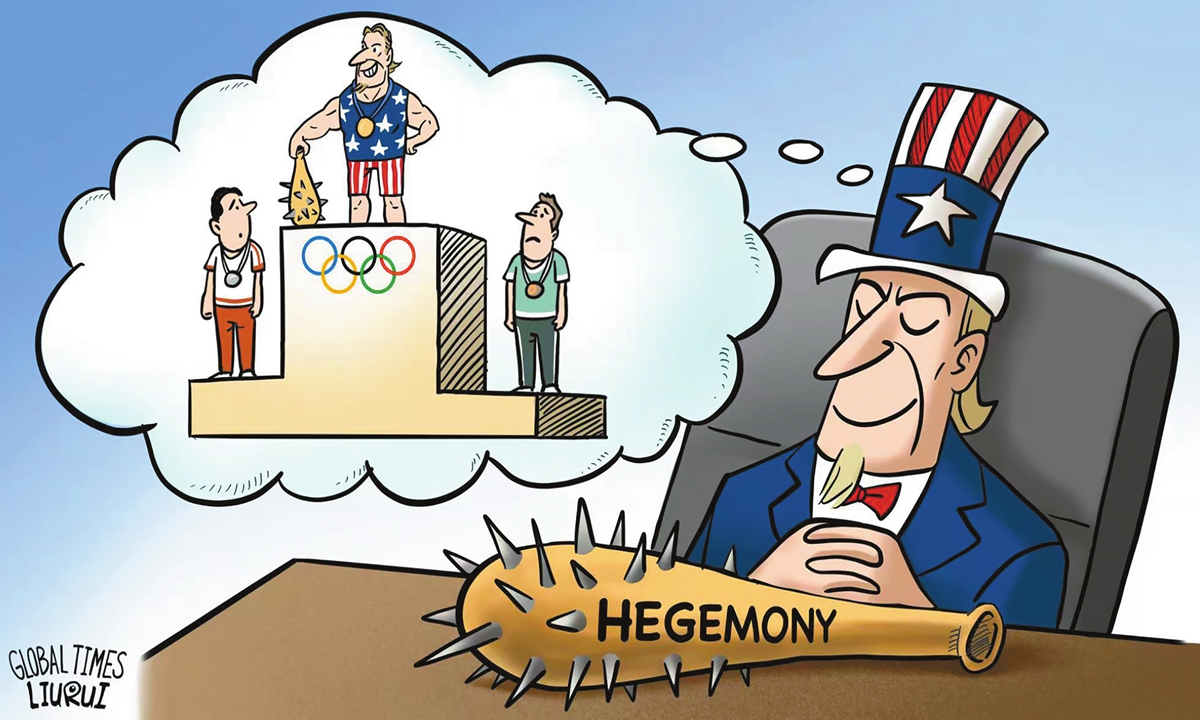
Illustration: Liu Rui/GT
The Paris Olympics has concluded, with the Chinese delegation securing 40 gold medals, their best performance at an overseas Olympics and equaling the US in the gold medal count. The quadrennial Olympics not only provides a platform for the world's top athletes to compete but also serves as a bridge for enhancing understanding and strengthening exchanges between different countries, regions, and cultures.
However, Harvard University professor Graham Allison recently analyzed the situation from a geopolitical perspective, saying that "China's rise from essentially nowhere to become the leading rival of the United States in the Olympics mirrors its rise in virtually every other dimension to become the defining geopolitical rival in the twenty-first century." While Allison's interpretation is somewhat representative of Western views, it is an exaggerated and misguided interpretation of the Olympics.
The Olympic arena is not a platform for major power competition, but a space where athletes from all countries can compete together, regardless of race or culture, and share the values of cooperation, progress, equality, and friendship. The Olympic motto, "Faster, Higher, Stronger — Together," highlights the importance of surpassing national differences in development, political systems, and traditions, and competing fairly under common rules. In this way, the Olympics help bridge narrow-minded political, cultural, and ideological gaps and bring closer the people and societies represented by athletes from different countries and regions.
At the Paris Olympics, China and the US had the highest number of gold medals among all participating countries and regions. In this context, some analysts, like Allison, view the competition through the lens of the broader US-China rivalry. Since the Donald Trump administration, the US has treated China as its "biggest strategic competitor" and moved away from the engagement policy of the Bill Clinton era. The Joe Biden administration has continued Trump's approach, focusing on "decoupling," "de-risking," and other strategies to counter China. This perspective extends even to the Olympics, framing the gold medal count as part of the larger geopolitical contest between the two countries.
Objectively speaking, under the combined influence of factors such as the rise of emerging economies, the world is experiencing unprecedented changes that are accelerating. However, since the "Age of Exploration" 500 years ago and the First Industrial Revolution which started from about the 1760s, Western countries have continued to dominate global industrialization, technological innovation, and the redistribution of wealth and power worldwide. This situation is likely to persist for some time, with the overall global structure of power, technology, and wealth remaining in a "West strong, East weak" pattern.
In a sense, the current global power distribution pattern is still "Western-centric." In order to maintain its unipolar hegemonic position, the US views China, which has the closest comprehensive strength to it, as the "greatest threat," disregarding the changes in world politics in the 21st century and the common desire for peace and sustainable development among the people of both countries and the vast majority of the world. The US stubbornly maintains a comprehensive strategic suppression against China. We remain vigilant and respond forcefully to US strategic containment, but at the same time, we clearly state that we do not want to engage in major-power strategic competition with the US, firmly reject "decoupling," a "new Cold War" and camp confrontation.
In this context, some in the US strategic community see the Paris Olympics as a battlefield for the strategic game between China and the US, which can only be seen as a distortion and tarnishing of the international Olympic spirit. China's development focuses on seeking happiness for the people and rejuvenation for the nation domestically, and on being a responsible major country internationally, striving to contribute Chinese wisdom and solutions and share the dividends of development with other countries. Although the number of gold medals at the Olympics is a matter of concern, in the face of increased US containment and suppression of China and the US strategic community's attempt to distort the Olympic spirit according to geopolitical logic, we need to continue to stay clear-headed and not fall into the trap of rhetoric such as "the competition for Olympic gold medals is a geopolitical competition between China and the US."
A great country that can continue to achieve remarkable achievements that attract the attention of the world must first and foremost focus on doing its own job well, continuously enhancing its leadership in modernization and technological innovation, fostering cohesion based on the happiness of the people, and strengthening the appeal of going global and influencing the world. From this perspective, behind the competition for Olympic gold medals lies a competition of a country's governance ability, development level, sports organization and management mechanisms, and its commitment to fairness and justice on the world stage.
At the Paris Olympics, China firmly supports the International Olympic Committee in effectively governing the world's highest-level sports events, and also firmly supports the World Anti-Doping Agency in implementing independent, fair, consistent, and effective governance on a global scale. These actions vividly reflect China's long-standing belief in the promotion of the development of the international order and global governance toward a more just and reasonable direction.
The various aspects of the Paris Olympics can help us to look at ourselves and the world more rationally, objectively, and calmly. The geopolitical interpretation of this international top sports event is worth our vigilance, and it also allows us to strategically examine the changes in China's relationship with the world, and to more scientifically and accurately view the great power competition instigated by the US and other Western countries. In the midst of the complex and severe international strategic situation, we need to consider our long-term response strategies. Based on this understanding, we will continue to play a positive role in the international community, think and respond to major power relations rationally and soberly, continuously shape and advance our neighborhood diplomacy, and showcase the Chinese people's worldview and strategic wisdom more comprehensively.
The author is director of the Institute of International Studies at Nanjing University. opinion@globaltimes.com.cn

